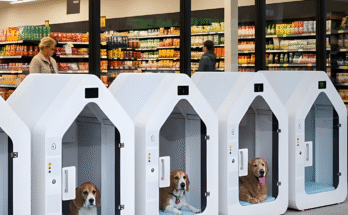In a world where technology continues to seep into every corner of our lives, Beijing has just taken things to an entirely new—and unexpected—level. Picture this: you step into a restroom, use a urinal, and within minutes, it gives you a personalized health report. Sounds futuristic? It’s already happening.

Beijing has begun rolling out AI-powered smart urinals that can analyze your urine in real-time, transforming one of life’s most ordinary moments into a window into your health. These high-tech fixtures are equipped with IoT sensors, AI-driven diagnostics, and digital dashboards, allowing them to test for hydration, glucose levels, proteins, pH balance, and even signs of urinary tract infections—all while you’re still in the restroom.
Yes, the future of health monitoring is literally flowing beneath our feet.
A Health Check Without a Hospital Visit
The idea is simple yet revolutionary: instead of waiting for a doctor’s appointment or traveling to a clinic, these urinals bring health screening directly into daily routines. Within minutes, the AI-powered system provides instant feedback. A digital display above the urinal shows results like hydration levels or early warning signs of potential issues such as diabetes, kidney disease, or infection.
For those who prefer privacy, the system can also send the results directly to a linked mobile app, where users can track their data over time, receive personalized insights, or even share reports with their doctor. It’s non-invasive, fast, and private—a small step that could change the way urban populations approach healthcare.
How It Works: The Science Behind the Stream
The technology inside these smart urinals combines Internet of Things (IoT) sensors, AI algorithms, and real-time analytics. As a person uses the urinal, the sensors collect a micro-sample of urine. This sample is analyzed for key biomarkers, and the AI instantly interprets the results, comparing them against health standards.
Using this data, the system can identify early signs of conditions like dehydration, high blood sugar, or kidney stress—often long before symptoms become noticeable.
In essence, these urinals act as mini health laboratories, silently working to detect the invisible red flags in our bodies.
Smarter Cities, Healthier Citizens
This innovation is more than just a tech novelty—it’s part of Beijing’s broader vision of “smart city health infrastructure.” By embedding medical technology into public spaces, the city aims to make health tracking as effortless as checking the weather.
Imagine smart toilets in offices, malls, and transport hubs—all quietly monitoring public health trends. If a cluster of readings indicates dehydration during a heatwave, city officials could issue public health alerts. If early signs of infection rise in a district, resources could be directed there preemptively.
This is preventive healthcare on a civic scale—proactive, data-driven, and incredibly efficient.
Privacy and the Promise of Prevention
Naturally, the rise of AI health devices raises questions about data privacy and consent. Beijing’s system reportedly ensures that individual data is encrypted and anonymized unless a user opts to link their device to their personal app.
Still, the potential benefits are enormous. Routine, passive testing could help detect chronic illnesses early, reduce healthcare costs, and empower individuals to monitor their health effortlessly. For busy urban residents, it’s like having a doctor’s assistant hidden inside the restroom wall—always ready, never intrusive.
A Glimpse into Tomorrow
Today, it’s urinals. Tomorrow, it could be AI-integrated toilets, mirrors, and sinks capable of analyzing saliva, sweat, or even skin texture for health indicators. The bathroom, once just a private space, is fast becoming the next frontier of preventive medicine.
Beijing’s smart urinals represent more than a quirky tech story—they mark a pivotal moment in the evolution of everyday healthcare. By merging artificial intelligence, public infrastructure, and human biology, China is showing the world what a truly connected, health-conscious city might look like.
So next time you visit a restroom in Beijing, remember—you might not just be taking a break. You could be taking the smartest health check of your day.



